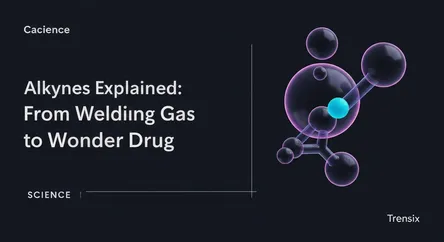Science
Alkynes Explained: From Welding Gas to Wonder Drug

An overview of alkynes, unsaturated hydrocarbons with triple bonds, and why they are crucial in industries from manufacturing to modern medicine.
What is it?
An alkyne is an unsaturated hydrocarbon containing at least one carbon-carbon triple bond. This triple bond is their defining functional group and consists of one sigma bond and two pi bonds, making alkynes highly reactive. The general chemical formula for acyclic alkynes with one triple bond is CnH2n-2. The simplest alkyne is ethyne (C2H2), commonly known as acetylene. Alkynes are traditionally used as fuel, with acetylene being famous for its use in oxyacetylene welding and cutting torches due to the high temperature of its flame. They are also fundamental building blocks in organic synthesis for creating more complex molecules.
Why is it trending?
Alkynes are at the forefront of chemical innovation. Their high reactivity makes them key players in "click chemistry," particularly the azide-alkyne cycloaddition, which allows for the efficient creation of complex molecules. This has major implications in drug discovery and materials science for creating new compounds with specific functions. Researchers are exploring novel organic transformations involving alkynes to build valuable molecular scaffolds for pharmaceuticals. In materials science, alkynes are used to synthesize advanced polymers like polyacetylene, which has conductive properties for electronic devices, and to construct low-dimensional nanostructures like molecular wires. Furthermore, there's a growing focus on developing sustainable methods for synthesizing alkynes, including from renewable, bio-based sources.
How does it affect people?
Alkynes have a significant and diverse impact on daily life. The most common alkyne, acetylene, is used industrially for welding and cutting metals and as a precursor for making other important organic compounds like ethanol and acrylic acid. Many plastics and synthetic rubbers are manufactured using alkyne derivatives. In medicine, the alkyne functional group is present in various drugs, including antifungal, anti-HIV, and anti-cancer agents, and is used in the synthesis of contraceptives. The versatility of alkynes in organic synthesis allows chemists to build complex molecules needed for developing new pharmaceuticals, agrochemicals, and advanced materials with unique properties.